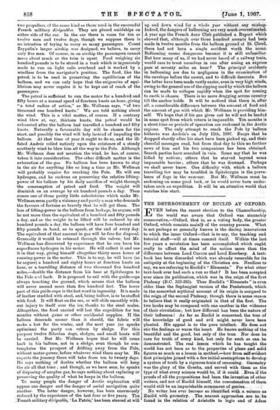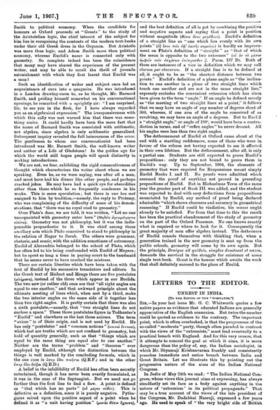THE DETHRONEMENT OF EUCLID AT OXFORD.
-9YEN befont the recent election to the Chancellorship, 11 the world was aware that Oxford was etaimeltly conservative,—Oxford, that is, as a voting body, the greater Oxford, which consists mainq of the country parson. What is not perhaps so generally known is the daring innovations to which the inner ,Oxferd—that is to say, the *Aching and tutorial staff—will at times commit itself. Within the last few years a revolution has been accomplished which ought really to affect the mind of the nation more than the difference between Lord Curzon and Lord Rosebery. A text- book has been discarded which was already venerable for its antiquity at the beginning of the Christian era. Needless to say, we are referring to Nuclid's " Memento." Per what other text-book ever had such a run as that ? It has been accepted ever since its publication, which was in the reign of the first Ptolemy (B.C. 323-285). Thus Euclid's " Elements" is even older than the Septuagint version of the Pentateuch, which in the somewhat mythical account of its origin is assigned to the reign of the second Ptolemy, though there ie some reason to believe that it really originated in that of the first, The two books may be compared with one another in the wideness of their circulation; but how different hint been the nature of their inauencel As far as Euclid is coneerned, the tree of the knowledge of good and evil might never have been planted. His appeal is to the pure intellect. He does not stir the feelings or warm the heart. NO knows nothing of the beautiful and the good, but only of the true. Nor does he care for truth of every, kind, but only for snob as can be demonstrated. The real lesson which he bap taught the world has not been as to the properties of plane and solid figures so much as a lesson in niethod,—how from self-evident first principles jpined with a few initial assumptions to develop a system of truth by a rigorous train of reasoning. Geometry was the glory of the Greeks, and served with them as the type of virhat every science would be, if it could. liven if the proofs of all the propositions had been the invention of other writers, and not of Euclid himself, the concatenation of them would still be an imperishable monument of genius.
No writer has ever become so identified with a science as Bead with geometry. The nearest approaches are to be found in the relation of Aristotle to logic and of Adam
Smith to political economy. When the candidate for honours at Oxford proceeds at "Greats" to the study of the Aristotelian logic, the chief interest of the subject for him lie in recognising the contents of the modern text-books under their old Greek dress in the ()Tartan. But Aristotle was more than logic, and Adam Smith more than political economy, whereas Euclid's name is connected only with geometry. So complete indeed has been the coincidence that many may have shared the experience of the present writer, and may be able to recall the thrill of juvenile setonishment with which they first learnt that Euclid was a map!
Such an identification of writer and subject once led an acquaintance of ours into a quagmire. He was introduced in a London drawing-room to, as he thought, Mr. Barnard Smith, and priding himself somewhat on his conversational openings, be remarked with a sprightly air : "I am surprised, Sir, to see you in the flesh, for I have always regarded you as an algebraical expression." The inesponsiveness with which this sally was met warned him that there was some- thing amiss. It could hardly have been the mere fact that the name of Barnard Smith was associated with arithmetic, not algebra, since algebra is only arithmetic generalised. Subsequent inquiry revealed the full heinousness of the error. The gentleman to whom our conversationist had been introduced was Mr. Barnett Smith, the well-known writer and author of a Life of Gladstone! In the golden age for which the world still hopes people will speak distinctly in making introductions.
We are not, we fear, exhibiting the rigid consecutiveness of thought which characterises the writer about whom we are speaking. Even be, as we were saying, was after all a man, and must have had his dinner like other people, and perhaps crucked jokes. He may have had a quick eye for absurdities other than those which he so frequently condemns in his works. 'Phis is mere speculation ; but there is 'one bon met assigned to him by tradition—namely, the reply to Ptolemy, who was complaining of the difficulty of some of his demon- strations, that "there was no royal road to geometry."
Over Plato's door, we are told, it was written, "Let no One' unacquainted with geometry enter here" (MrpVis ayecopirpgroc drive). Geometry was not philosophy, but it was the indis- pensable propaedeutic to it. It was chief among those ancillary arts which Philo conceived to stand to philosophy in the relation of Hagar to Sarah. The others were grammar, rhetoric, and music, with the addition sometimes of astronomy. Euclid of Alexandria belonged to the school of Plato, which has often led to his being confounded with Euclid of Megara but he spent so long a time in paying court to the handmaid that he seems never to have reached the mistress.
There are certain liberties which have been taken with the text of Euclid by his successive translators and editors. In the Greek text of Halbert and Menge there are five postulates (eariawra), instead of the three which appear in our Euclid& The two new (or rather old) ones are that "all right angles are equal to one another," and that awkward principle about the ultimate meeting of lines which, when met by a third, make the tWP interior angles on the same side of it together less than two right angles. It is pretty certain that there was also a sixth postulate.—namely, that "two straight lines do not enclose a space." These three postulates figure in Todhunter's "Euclid" and elsewhere as the laat three axioms. The term "axiom" is of Stoic origin, and is not used by Euclid. He bps only "postulates" and "common notions" (Kolval &yowl), which-last are Opals which are not confined to geometry, but hold of quantity generally, such as that "things which are equal to the same thing are equal also to one another." Neither are the terms "problem" and " theorem " ever employed by Euclid, although the distinction between the things is well marked by the concluding formula, which in the one case is il'rE p ide, rotiurin (Q.E.F4 and in the other Arfp 21st aeitai A. belief in the infallibility of Euclid has often been secretly entertained, though it has never been overtly formulated, as it was in the ease of the Septuagint.. But we need not go further than the first hue to find a Slaw. A point is defined as "that which has no parts" (MI piper ' This is defective as a definition, since it is purely negative. Pytha- gorae seized upon the positive aspect of a point when be defined it as "a unit having position" (.Lovits Bian, ikovcra),
and the best definition of all is got by combining the positive and negative aspects and saying that a point is position without magnitude (Now &et. peyttlovs). Euclid's definition of a straight line as "one which lies evenly with its own
points" (4 /ova Toic anuelon) is hardly an improve- ment on Plato's definition of "straight" as "that of which the mean is opposite to the two extremes" (or. picrov ja-xcirom 6thrpoc4cv g. Parra. 137 D). Both of them are instances of a vice in definition which we may call durum per obscurum. If a straight line is to be defined at all, it ought to be as "the shortest distance between two points." Euclid's definition of a plane angle as "the inclina- tion to one another in a plane of two straight lines which touoh one another and are not in the same straight line," expressly excludes the convenient extension which has since been given to the term "angle." If an angle be defined merely as "the meeting of two straight lines at a point," it follows that we may have an angle of any number of degrees short of 360, whereas, if one arm of the angle be conceived of as revolving, we may have an angle of n degrees. But to Euer d a "straight angle," or angle of 180*, would bare been a contra- diction in terms, and of "reflex angles" be never dreamt. All his angles were less than two right angles.
The dethronement of Euclid at Oxford came about at the end with a startling suddenness, some of those who were in favour of the reform not baying expected to see it effected in their own lifetime. But the dethronement, after all, is only a partial one. Students are still expected to prove Euclid's propositions, only they are not bound to prove them in Euclid's way. Up to September, 1904, the elements of geometry that were required for Responsions meant simply Euclid Books I. and II. No proofs were admitted which assumed the proof of anything not proved in preceding propositions of Euclid. But in Michaelmas Term of the same year the greater part of Book III. was added, and the student was expected to deal with easy deductions from propositions enunciated by Euclid, any method of proof being declared admissible "which shows clearness and accuracy in geometrical reasoning." If Euclid could be vindictive, his manes ought already to be satisfied. For from that time to this the result has been the practical abandonment of the study of geometry on the part of the Oxford Passman. No one knows exactly what is required or where to look for it. Consequently the great majority of men offer algebra instead. The dethronera of Euclid console themselves with thinking that, when a generation trained in the new geometry is Bent up from the public schools, geometry will come by its own again. But the principle, Denique sit quidvis, simplex dumtaxat et 1.011074, demands the survival in the struggle for existence of some single text-book. Great is the honour which awaits the work that shall definitely succeed to the place of Euclid.







































 Previous page
Previous page